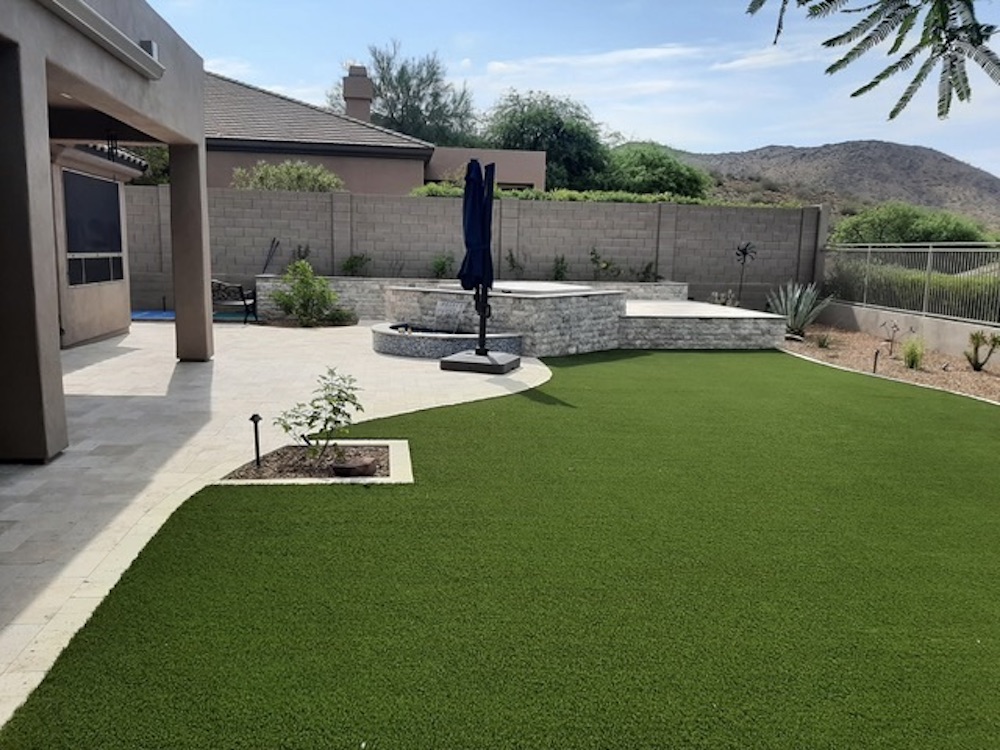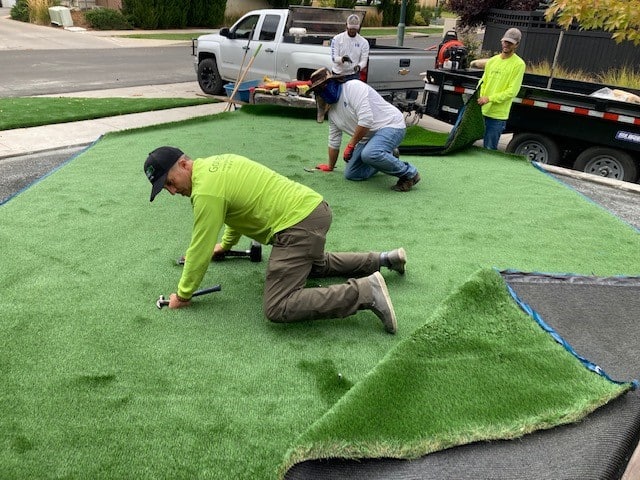Artificial Grass Canoga Park Benefits for Busy Homeowners
Artificial Grass Canoga Park Benefits for Busy Homeowners
Blog Article
Top Factors to Think About Artificial Grass for a Low-Maintenance and lush Yard
As home owners increasingly look for sustainable solutions for outside spaces, artificial grass provides an appealing alternative to traditional lawns. Its capability to preserve a lively look year-round without the worries of watering, mowing, or chemical treatments makes it a functional selection for those aiming to lower upkeep efforts. Moreover, the environmental advantages, consisting of significant water conservation and decreased dependence on pesticides, line up with modern environmental worths. The benefits prolong beyond simple aesthetic appeals and sustainability; discovering the complex effects of man-made yard reveals an extensive method to yard management that qualities much deeper factor to consider.
Year-Round Greenery
One of one of the most substantial advantages of artificial turf is its capacity to give year-round plant, no matter climate conditions. Property owners frequently encounter obstacles in keeping a vivid grass because of seasonal modifications, droughts, or heavy rainfall. Artificial yard gets rid of these worries, making sure a constantly rich appearance throughout the year.
This artificial choice is crafted to stand up to different weather circumstances, from blistering summer heat to cold wintertime temperature levels. Unlike all-natural lawn, which may brownish or end up being irregular during extreme problems, synthetic grass keeps its lively color and texture, boosting the aesthetic allure of any type of landscape.
Furthermore, man-made grass is immune to insects and illness that typically impact natural grass. This resilience adds to its enduring beauty, as there is no demand for chemical therapies or fertilizers that can be dangerous to the environment. House owners can enjoy the visual advantages of a well-kept grass without the cyclical difficulties postured by natural turf treatment.
Reduced Maintenance Initiatives
Artificial grass dramatically reduces maintenance efforts, permitting home owners to delight in a beautiful yard without the taxing jobs related to all-natural grass treatment. Among one of the most noteworthy benefits of synthetic lawn is the removal of normal mowing. Without any demand for a lawnmower, property owners conserve both time and the price of upkeep connected with this devices.

Cleansing artificial turf is uncomplicated; an easy rinse with a hose pipe or the occasional cleaning to remove debris is usually sufficient - artificial grass. This simplicity of treatment permits homeowners to spend even more time enjoying their outside rooms instead of struggling over them. In summary, the minimized maintenance initiatives related to synthetic turf make it an appealing selection for those looking for a gorgeous, convenient yard
Water Preservation Conveniences
The significant reduction in maintenance efforts associated with synthetic grass reaches water conservation, making it an environmentally friendly option for home owners. Traditional lawns require substantial amounts of water to continue to be vivid and lavish, often causing too much water use, especially view it in deserts. In contrast, synthetic turf eliminates the need for regular watering, dramatically decreasing the general water usage in your yard.
By selecting artificial lawn, homeowners can save countless gallons of water yearly. This shift not just advantages individual households yet likewise adds to more comprehensive ecological efforts aimed at lowering water waste. In locations experiencing water shortage, the adoption of artificial yard can play a considerable role in mitigating the results of drought and ensuring that beneficial water resources are used a lot more efficiently.
In addition, the setup of synthetic yard can help reduced local water demand, profiting the community in its entirety. With growing understanding of environmental problems, choosing man-made grass works as a positive action towards lasting landscaping, assisting to protect all-natural water sources while keeping an aesthetically pleasing exterior area (backyard artificial grass). In summary, man-made yard presents an engaging service for water conservation, lining up ecological informative post responsibility with contemporary landscape design demands

Parasite and Allergy Reduction
A significant advantage of mounting artificial grass is its ability to lower parasites and irritants in outside spaces. Traditional turf lawns frequently function as reproducing grounds for insects such as mosquitoes, ticks, and ants, which can develop pain and health and wellness risks for family members and pet dogs. In contrast, synthetic grass removes the natural product that draws in these pests, thereby dramatically reducing their populaces in your lawn.
Furthermore, natural lawn can harbor mold and mildew, pollen, and other irritants, which can set off allergic reactions and breathing concerns for sensitive individuals. Artificial turf supplies a cleaner environment, lowering the potential for allergenic responses. Unlike all-natural turf, artificial lawn does not produce plant pollen, making it an excellent alternative for allergy patients looking for to enjoy their exterior spaces without the threat of flare-ups.
Furthermore, the lack of soil in man-made lawn implies there is less dust and dirt, more minimizing airborne irritants. This low-maintenance option not just boosts the aesthetic charm of your lawn yet likewise advertises a healthier outdoor setting, enabling families to appreciate their grass without the continuous concern of bugs and allergens. Therefore, artificial lawn is a critical option for those focusing on convenience and health and wellness in their outdoor space.
Long-Term Cost Cost Savings
Spending in artificial turf can result in significant long-lasting cost financial savings for homeowners. While the first financial investment might seem considerable, the monetary advantages gradually can be substantial. Artificial lawn eliminates the demand for regular grass maintenance expenditures, such as mowing, feeding, and watering. Conventional yards typically call for considerable resources to preserve a rich appearance, especially in areas susceptible to dry spell or severe climate condition.
In addition, the long life of synthetic grass additionally enhances its cost-effectiveness. Many premium man-made turf Recommended Site items can last 15 to 25 years with marginal upkeep, decreasing the need for substitute or considerable fixings. In contrast, natural yard might need frequent reseeding and normal care, which can quickly accumulate in costs.
Energy cost savings are an additional important factor. Home owners can expect to see lower water costs, as synthetic grass does not need watering. In addition, the reduction in yard treatment solutions can free up valuable time and resources, enabling home owners to allot their budget plans in other places.
Final Thought
In recap, artificial turf provides countless benefits for home owners seeking a dynamic and low-maintenance landscape. Inevitably, the lasting price financial savings connected with fabricated lawn strengthen its status as a practical and sustainable service for enhancing outdoor spaces.
Synthetic turf dramatically decreases maintenance efforts, allowing homeowners to delight in a beautiful grass without the lengthy tasks connected with natural grass treatment.The significant decrease in maintenance efforts linked with fabricated yard prolongs to water conservation, making it an eco pleasant choice for property owners. In contrast, artificial turf eliminates the demand for normal watering, substantially lowering the general water intake in your lawn.
In areas experiencing water scarcity, the fostering of synthetic grass can play a significant duty in minimizing the impacts of drought and making certain that useful water resources are utilized extra effectively.
With growing recognition of environmental concerns, selecting fabricated grass offers as an aggressive step towards sustainable landscape design, aiding to maintain natural water resources while keeping a cosmetically pleasing outdoor room.
Report this page